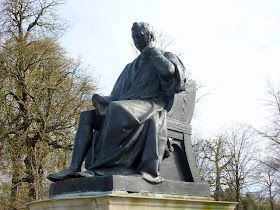Edward Jenner MD, FRS
London, England
GPS: N51° 30.634; W000° 10.510
Short Description:
The statue was Edward Jenner, naturalist, physician and scientist, is located in the Italian Gardens area of Kensington Gardens in London, England.
Long Description:
Edward Anthony Jenner, MD, FRS was born on May 17, 1749 in Berkeley, Gloucestershire, England. He the pioneer the development of smallpox vaccine which eventually led to the eradication of the disease on earth. He is consider to be the founder of the field of immunology.
Edward Jenner was elected a Fellow of the Royal Society (FRS), the highest honor bestowed on a scientist by United Kingdom, on 25 February 1789. He died of a stroke on January 26, 1823.
The bronze statue of Edward Jenner by William Calder Marshall RA located in the Italian Gardens was originally erected in Trafalgar Square in 1858. It was moved to Kensington Gardens in 1862 as a result of pressure from groups opposed to vaccination.
A 6' high bronze statue rests on a granite plinth and on a 7' high granite base flanked by a pair of stone benches. Edward Jenner is seated in a high-backed chair decorated with a caduceus on the side. He is wearing a long robe and calf-length stockings. His chin is resting on his left hand and he is looking down in the direction of his right hand which is holding a scroll of paper.
A red granite plaque on the front of the base is simply inscribed:
JENNER
A plaque added in 1996, to commemorate the 200th anniversary of the Jenner's medical experiment with cowpox vaccine of May 14, 1796. It tells the story of the Jenner's discovery and provides details of Edward Jenner education and professional life.
It is inscribed:
Edward Jenner was elected a Fellow of the Royal Society (FRS), the highest honor bestowed on a scientist by United Kingdom, on 25 February 1789. He died of a stroke on January 26, 1823.
The bronze statue of Edward Jenner by William Calder Marshall RA located in the Italian Gardens was originally erected in Trafalgar Square in 1858. It was moved to Kensington Gardens in 1862 as a result of pressure from groups opposed to vaccination.
A 6' high bronze statue rests on a granite plinth and on a 7' high granite base flanked by a pair of stone benches. Edward Jenner is seated in a high-backed chair decorated with a caduceus on the side. He is wearing a long robe and calf-length stockings. His chin is resting on his left hand and he is looking down in the direction of his right hand which is holding a scroll of paper.
A red granite plaque on the front of the base is simply inscribed:
It is inscribed:
1749 - 1823 Country Doctor Who Benefited Mankind In Jenner's time smallpox was a dreaded disease worldwide and caused many deaths particularly of children. Survivors were left badly scarred and often blinded or deformed. In 1796, Jenner vaccinated James Phipps with cowpox and showed that the boy was then immune to smallpox. He predicted the worldwide eradication of smallpox. This was finally achieved in 1980. Jenner was born, practiced and died in Berkeley Gloucestershire and studied at St. George's Hospital, London. This statue by William Calder Marshall RA was inaugurated by Prince Albert, the prince Consort and was first to be erected in Kensington Gardens in 1862. The cost was met by international subscription. This plaque was funded and placed here by the friends of Hyde Park and Kensington Gardens, The Jenner Educational Trust and St. George's Hospital Medical School in 1996, the Bicentennial Anniversary of Jenner's discovery. |



No comments:
Post a Comment